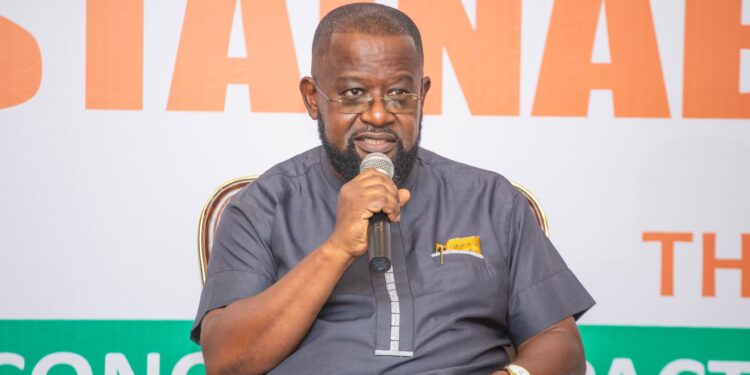Illegal mining (galamsey) activities could undermine Ghana’s plans to begin onshore oil drilling next year, a leading member of the Convention People’s Party (CPP) and political commentator, Kwame Jantuah, has warned.
Jantuah, who also serves on the board of the Ghana National Petroleum Corporation (GNPC), said unchecked galamsey — or illegal small-scale mining — is spreading into areas identified for oil exploration and could contaminate potential drilling zones.
“We’ve identified oil seepages in the north and south, and drilling is expected to begin in the third quarter of next year. But if those blocs are galamsey-laden, it will affect the country’s oil revenue,” Jantuah said on Asaase Radio’s The Forum on Saturday (11 October).
He said Ghana risks losing billions in potential oil income if illegal mining is not curtailed immediately, warning that polluted soils and water bodies could interfere with exploration and development work.
Jantuah argued that successive governments have failed to address the root causes of galamsey, including unemployment and poor regulation of small-scale mining.
He called for a temporary ban on small-scale mining to restructure the sector into a more commercially viable and environmentally sustainable operation.
“If we don’t structure it properly, galamsey will threaten all our natural resources — from gold to oil,” he cautioned.
The government, he added, must act decisively to protect oil-rich lands and enforce strict environmental standards before onshore exploration expands in 2026.
Ghana, one of Africa’s top gold producers, discovered several onshore oil seepages in recent years, with the GNPC announcing plans to begin drilling in parts of the Northern and Western regions.
But widespread illegal mining continues to destroy farmlands, forests, and river systems, sparking growing concern among experts and civil society groups.
In a related development, the National Vice President of the University Teachers Association of Ghana (UTAG), Ebenezer Teye Amanor-Lartey, has called on the John Mahama government to outlaw surface mining, warning that the practice is destroying forests, rivers, and communities at an alarming rate.
He said surface mining – a key driver of illegal mining or galamsey – has devastated water bodies and farmland across the country.
The senior lecturer also maintains that the government’s efforts to curb illegal mining have fallen short, describing them as “a show” that has failed to produce tangible results.
“In some countries, surface mining is banned because it destroys water bodies,” Amanor-Lartey told Gemma Appiah on The Forum on Asaase Radio on Saturday (11 October). “If you want to do proper mining, make a serious investment. We should not be toying with this issue.”
“How many people have been arrested? How many are in jail? When taps run brown in Winneba, it tells us the situation is getting out of control…You see people by the roadside mining with impunity,” he said.
UTAG, which has been vocal on environmental issues, insists its position is nonpartisan.
“We are not quiet,” Amanor-Lartey said, responding to critics who accuse the group of political bias. “Our forests are being destroyed, and people are mining by the roadside. This is an emergency.”
Ghana, one of Africa’s top gold producers, has struggled to regulate small-scale mining. Surface mining – which removes topsoil and vegetation to access ore – has been blamed for widespread deforestation and contamination of major rivers, including the Pra, Offin, and Ankobra.
Amanor-Lartey said the government should revoke licenses of small-scale miners who flout environmental rules and pursue stricter sanctions against offenders.
“If the government can arrest a few people, it is a drop in the ocean. The major problems have to be tackled,” he said.
“The food we eat and the water we drink are now contaminated. We think there is more room for improvement, and banning surface mining will be a strong first step.”






